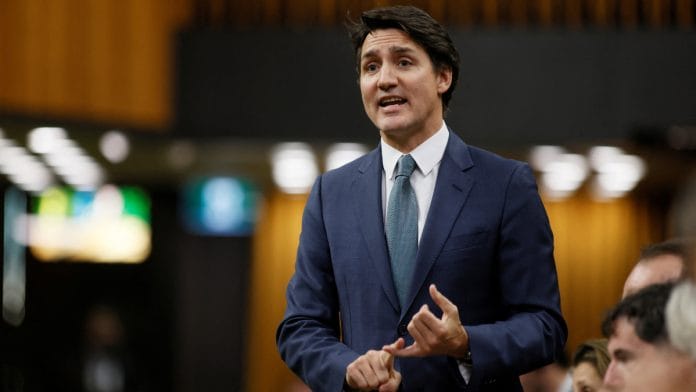New Delhi: Canadian Prime Minister Justin Trudeau Wednesday conceded that his government only had “intelligence” and not “evidentiary proof” of links between Indian government officials and Hardeep Singh Nijjar’s killing when Ottawa first reached out to New Delhi in August last year.
At a hearing of the Foreign Interference Commission, Trudeau went on to explain the alleged chain of operation indicating that Indian diplomats collected information on individuals, which was then passed onto the “highest levels” in New Delhi, which was then given to the Lawrence Bishnoi gang to commit acts of violence in Canada.
“In late July, early August, I was briefed on the fact that there was intelligence from Canada and possibly from Five Eyes allies that made it fairly clear, credibly clear that India was involved in this killing [Nijjar],” the Canadian PM said.
He added: “Our immediate approach was to engage with the government of India. We had our various security officials reach out to India and say, ‘look there are real concerns that your [Indian] security agencies in the killing of Nijjar, we need to work on this together’.”
“We chose to continue to work behind the scenes to try and get India to cooperate with us. Their ask of us was, ‘well how much do you know? Give us the evidence on this’. Our response was, well, it’s within your security agencies you should be looking into how much they know. You should be engaging us. ‘No no tell us what you know, show us the evidence’. At that point it was primarily intelligence not hard evidentiary proof,” Trudeau further said.
The Canadian PM made the claims before the commission set up to investigate foreign interference in the North American country’s 2019 and 2021 elections.
A timeline of discussions with India over Nijjar
According to Trudeau, conversations with India first occurred sometime in August last year. The Canadian government did not release the allegations to the public at the time due to India hosting the G20 summit in New Delhi in the early weeks of September that year.
India sought evidence from the Canadian government on the allegations raised. But according to Trudeau, the information Ottawa had at the time was, “primarily intelligence, not hard evidentiary proof”.
The Canadian prime minister revealed his conversation with Prime Minister Narendra Modi at the end of the G20 Leaders’ Summit, where Trudeau “shared” that Ottawa knew India “was involved” in the killing of Nijjar, an India-designated terrorist.
According to Trudeau, Modi pointed out that Canada is harbouring “people who are outspoken against the Indian government”, whom India would like to see arrested. Trudeau revealed that he agreed to investigate any individuals if New Delhi shared any evidence indicating actions around “terrorism or the incitement to hate”.
His major grouse with New Delhi, the Canadian PM said, was that the Indian government refused to take responsibility for the allegations raised by Ottawa, but rather doubled down over the fact that there was no evidence shared.
While the original allegations set off a diplomatic chill, in recent days, ties between India and Canada have taken a turn for the worse. Ottawa requested New Delhi to waive diplomatic immunity and allow its diplomats in Canada — including High Commissioner Sanjay Kumar Verma — to cooperate with the investigations.
The Canadian prime minister Wednesday conceded that Ottawa would probably not have waived diplomatic immunity if it were in a similar predicament.
India withdrew the six diplomats Monday and expelled six Canadian diplomats including the acting high commissioner and deputy high commissioner.
India maintains that the allegations raised by Trudeau are for his own domestic politics with no evidence of links between Indian officials and violent crime in the country.
(Edited by Gitanjali Das)
Also Read: Trudeau calls Chinese interference in Canadian politics ‘part of what diplomats do’







Why did you mutilate Trudeau’s deposition? He was talking about the early stage last year when they started investigating. How can any country have proof at the beginning of any investigation? If India was not involved, it should have extended all cooperation. Instead quoting sn arbitrary selection of worfs is pathetic
elective
In fact, non-journalists like us are better off than incompetent article writers.
Whether Canada has solid evidence against Indian govt officials is simply immaterial.
What matters is that Canada has received the green signal from USA to go hammer and tongs at India on this issue. It is US approval which has resulted in Canada making wild allegations targeting Indian diplomats, the RAW chief, the NSA Ajit Doval and the HM Amit Shah.
It’s basically an ideological battle playing out through a proxy. The US Democrats have always hated the Modi/Shah duo and the Hindutva ideology of BJP/RSS. The Canadian Liberals led by Trudeau shares this hatred with his US counterparts.
By Trudeau’s own admission, it was US intelligence input to Canada (as part of Five Eyes) which made Canada suspect Indian involvement in Nijjar’s murder.
So, basically, the US has let loose it’s pet dog, the Canadians, on India.
US frustration with India also stems from the fact that India has refused to condemn Russia so far and continues to have close military and economic ties with Russia.